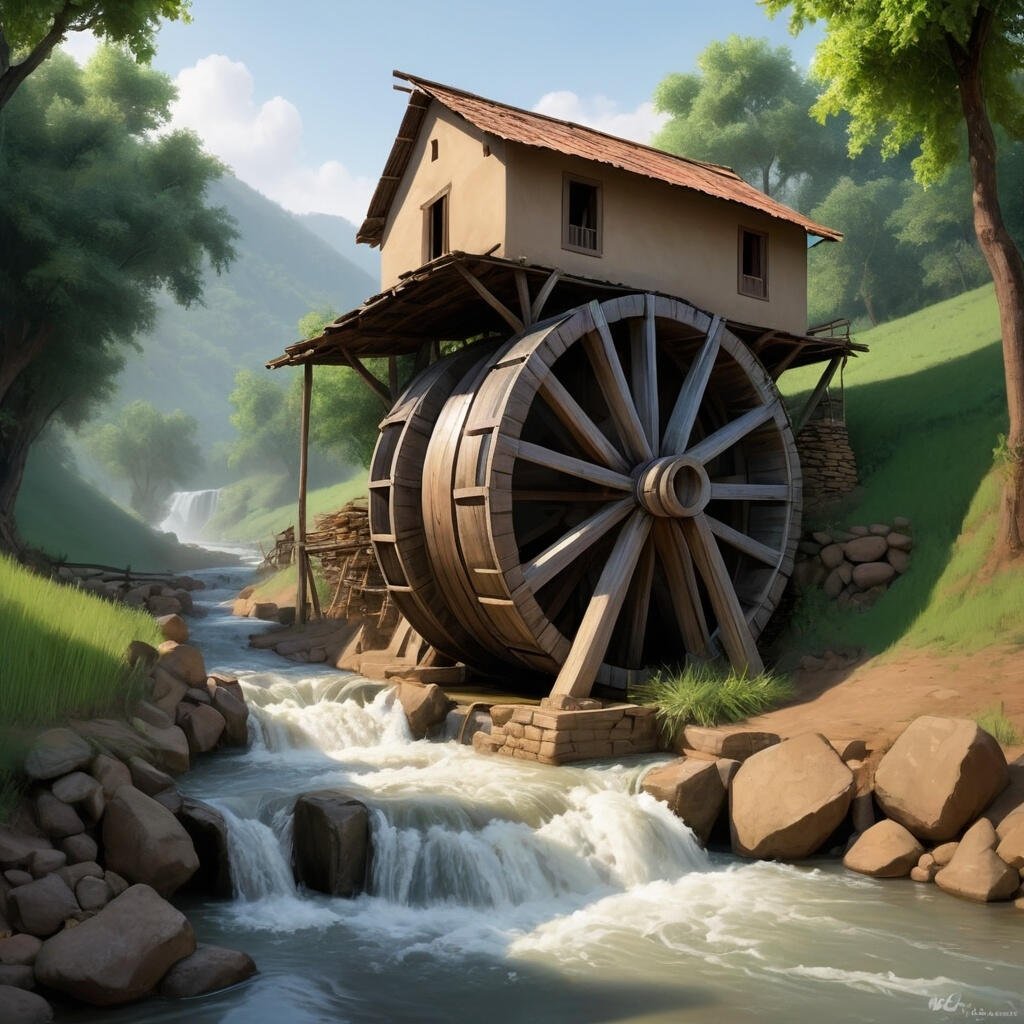westra on Nostr: Nighttime Grind: The Water Wheels that Saved the Day (and the Flour) ...
Nighttime Grind: The Water Wheels that Saved the Day (and the Flour)

In a small village nestled in the hills, there was a magical river that provided water to all the villagers. The river always flowed, but its currents were strongest during certain times of the day and certain seasons. At night and during rainy seasons, the river would swell, carrying much more water than the villagers needed. This excess water often flowed away unused, spilling over the banks and being wasted.
The village elders were concerned about this waste. They knew that during the day, when everyone was awake and active, there was often just enough water for all the villagers' needs. But at night, when everyone was asleep, the river overflowed. “What can we do to avoid wasting this precious water?” they wondered.
One day, a clever young woman named Lyra came up with an idea. She proposed building a series of water wheels along the riverbanks. These water wheels would turn and grind grain into flour whenever the river's flow was strong. This way, the extra water at night wouldn't be wasted. Instead, it would power the water wheels and provide the village with flour.
But there was another part to Lyra's plan. The water wheels could be stopped easily if the village needed more water for drinking, cooking, or washing during the day. If the river's flow decreased, the wheels would halt, ensuring that the villagers always had enough water for their immediate needs.
The villagers agreed to try Lyra's idea. They built the water wheels, and soon they noticed a remarkable change. The water wheels turned tirelessly through the night, grinding grain and using the river's surplus power. During the day, when the villagers needed more water, they could simply stop the wheels. This balance allowed the village to use the river's power efficiently, reducing waste and ensuring a steady supply of flour and water.
Just like the water wheels in Lyra's village, Bitcoin miners use excess energy from power grids. They run their operations when there's surplus energy, especially from sources like wind and solar power. And just like the water wheels that could stop when water was needed elsewhere, Bitcoin miners can quickly reduce their energy consumption when the grid needs more power for homes and businesses.
This helps balance energy use, reduces waste, and makes the entire system more efficient.
See More at https://BitcoinSolutions.Pro

In a small village nestled in the hills, there was a magical river that provided water to all the villagers. The river always flowed, but its currents were strongest during certain times of the day and certain seasons. At night and during rainy seasons, the river would swell, carrying much more water than the villagers needed. This excess water often flowed away unused, spilling over the banks and being wasted.
The village elders were concerned about this waste. They knew that during the day, when everyone was awake and active, there was often just enough water for all the villagers' needs. But at night, when everyone was asleep, the river overflowed. “What can we do to avoid wasting this precious water?” they wondered.
One day, a clever young woman named Lyra came up with an idea. She proposed building a series of water wheels along the riverbanks. These water wheels would turn and grind grain into flour whenever the river's flow was strong. This way, the extra water at night wouldn't be wasted. Instead, it would power the water wheels and provide the village with flour.
But there was another part to Lyra's plan. The water wheels could be stopped easily if the village needed more water for drinking, cooking, or washing during the day. If the river's flow decreased, the wheels would halt, ensuring that the villagers always had enough water for their immediate needs.
The villagers agreed to try Lyra's idea. They built the water wheels, and soon they noticed a remarkable change. The water wheels turned tirelessly through the night, grinding grain and using the river's surplus power. During the day, when the villagers needed more water, they could simply stop the wheels. This balance allowed the village to use the river's power efficiently, reducing waste and ensuring a steady supply of flour and water.
Just like the water wheels in Lyra's village, Bitcoin miners use excess energy from power grids. They run their operations when there's surplus energy, especially from sources like wind and solar power. And just like the water wheels that could stop when water was needed elsewhere, Bitcoin miners can quickly reduce their energy consumption when the grid needs more power for homes and businesses.
This helps balance energy use, reduces waste, and makes the entire system more efficient.
See More at https://BitcoinSolutions.Pro
